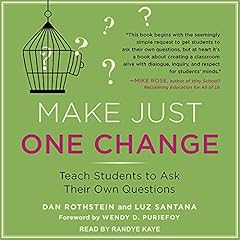
Ungrading
Why Rating Students Undermines Learning (and What to Do Instead)
No se pudo agregar al carrito
Add to Cart failed.
Error al Agregar a Lista de Deseos.
Error al eliminar de la lista de deseos.
Error al añadir a tu biblioteca
Error al seguir el podcast
Error al dejar de seguir el podcast
Obtén 3 meses por US$0.99 al mes
 Exclusivo para miembros Prime: ¿Nuevo en Audible? Obtén 2 audiolibros gratis con tu prueba.
Exclusivo para miembros Prime: ¿Nuevo en Audible? Obtén 2 audiolibros gratis con tu prueba.
Compra ahora por $18.08
-
Narrado por:
-
Emily Durante
-
Matthew Josdal
-
Alfie Kohn
The moment is right for critical reflection on what has been assumed to be a core part of schooling. In Ungrading, 15 educators write about their diverse experiences going gradeless. Some contributors are new to the practice and some have been engaging in it for decades. Some are in humanities and social sciences, some in STEM fields. Some are in higher education, but some are the K-12 pioneers who led the way. Based on rigorous and replicated research, this is the first book to show why and how faculty who wish to focus on learning, rather than sorting or judging, might proceed. It includes honest reflection on what makes ungrading challenging, and testimonials about what makes it transformative.
PLEASE NOTE: When you purchase this title, the accompanying PDF will be available in your Audible Library along with the audio.
©2020 West Virginia University Press; Foreword copyright 2020 by Alfie Kohn (P)2021 TantorLos oyentes también disfrutaron:




















Las personas que vieron esto también vieron:

















Those who have gone before give advice
Se ha producido un error. Vuelve a intentarlo dentro de unos minutos.
Good book but the PDF is missing
Se ha producido un error. Vuelve a intentarlo dentro de unos minutos.
Fascinating Techniques
Se ha producido un error. Vuelve a intentarlo dentro de unos minutos.
Already outdated
Se ha producido un error. Vuelve a intentarlo dentro de unos minutos.
Disappointing
Se ha producido un error. Vuelve a intentarlo dentro de unos minutos.


